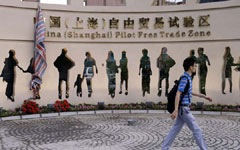Shanghai zone in search of identity
By Li Yang (China Daily) Updated: 2014-04-15 07:15Shanghai was a world financial center a century ago, when Tokyo, Hong Kong and Singapore were less well-known.
In its quest to regain the title, Shanghai needs to catch up with the front-runners, not just be content with leading other parts of China.
If the Shanghai FTZ administration cannot acquire an international vision, the Shanghai FTZ may follow in the footsteps of the Pudong new district.
Once a desolate area east of Huangpu River, Pudong was the central government's early effort at renewal.
In the 1990s, Pudong became a local showcase with its skyscraper clusters, contributed to local economic growth and promoted several local officials to the central government.
 |
 |
Fundamentally, local officials remain growth-driven, despite their pro-reform pledges. Many tend to equate the FTZ with tailor-made preferential policies in land, tax and exports.
Although the central government has stressed again and again that it will not roll out any preferential policies for any free-trade zone, it can't seem to dampen its local counterparts' itch to set up an FTZ.
About 30 provinces and cities have shown willingness to set up an FTZ, and at least 13 of them have applied for one this year. This is something similar to the mania they exhibited in the 1990s, when they applied to set up high-tech development areas and industrial parks.
Those areas and parks flourished with low taxes and cheap land. But with rising labor costs and declining exports, many have withered.
The national FTZ craze has motivated the Shanghai government, in its latest rules, to pressure the Shanghai FTZ to provide valuable lessons for financial reform in the planned three years.
Local officials believe the central government will pick up the tab with either more concrete plans or preferential policies.
Analysts believe that deepening financial reform within the FTZ and effective control over the border between it and the rest of China - to rein in speculation due to the incomplete nature of the renminbi's exchange rate reform - are central to its success.
Xia Bin, senior economist with Tianjin-based Nankai University and a counselor for the State Council, proposed that all financial sector practices should be done according to market rules and international conventions in the Shanghai FTZ.
"Otherwise, the FTZ loses its meaning," he pointed out.
|
 |
 |
| China's top 10 richest cities |
- Shanghai FTZ portends push to greater reform
- Reforms at Shanghai FTZ push financial opening
- Shanghai FTZ to roll out free trade account
- Shanghai FTZ 'negative list' may be cut by 40% to boost more interest
- Suzhou seeks to follow in Shanghai's FTZ footsteps
- China ready for new trials after Shanghai FTZ

















